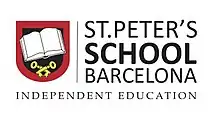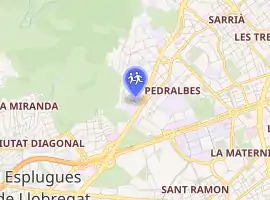St. Peter's School, Barcelona
Established in 1964 by José Mª Ginjaume Mencerré, Marian Garriga and Jaume Lerma, St. Peter's School was the first bilingual school in Barcelona, Spain. "...to give the opportunity for a high-quality, bilingual education aimed at developing to the full the individual capacity of each child and giving him strengths to cope with a future characterized by rapid changes..." [1] 1963, projected ideology of St. Peter's School.
| St Peter's School | |
|---|---|
 | |
| Location | |

| |
| Coordinates | 41.3889°N 2.1058°E |
| Information | |
| Type | International school |
| Established | 1964 |
| Grades | Nursery (12 months) to PreU (18 years) |
| Head of School | Jordi and Josep María Ginjaume Culell |
| Website | St. Peter's School website |

Overview
St Peter's School is accredited by the Spanish Ministry of Education, the Generalitat de Catalunya, the International Baccalaureate[2] and by the Best Schools in Spain[3] CICAE. The students obtain the Certificate in Primary Education when they finish Year 6, and the International Baccalaureate (IB) Diploma when Pre-U 2 is completed. Students also take the International Cambridge Examinations in Upper School and Pre-U, and external examinations to acquire certificates in Languages (ESOL in English, DELF in French, and A0 in German).[4]
School Structure
- Nursery (1 & 2 years)
- Lower School - Foundation Stage (3 to 5 years) & Primary School (6 to 9 years)
- Upper School (10 to 14 years)
- PreU (15 to 18 years) - IB Diploma Programme
Faculty
The St Peter's School staff includes 89 faculty members (teachers and learning assistants), 21 support staff, administrators and support center personnel.
- English native speakers 50%
- Spanish native speakers 45%
- Other 5%
Multilingual environment
From Nursery to Foundation 5, English is the main language in the classroom. Spanish is introduced gradually once students start Lower School, next to Catalan (3 hour a week) and French (from Year 5). German is introduced with the aim of students arriving to acquire a level of A0, according to the Common European Framework and Reference for Languages (CEFR).[5]
PISA Results
The Program for the International Assessment of Students (PISA)[6] was promoted by the OECD (Organization for Economic Cooperation and Development). These tests evaluate the ability to apply learned knowledge and skills in real life situations, in order to reason and communicate more effectively.
Graduates
Their graduates earn the International Baccalaureate Diploma. They also achieve university level language qualifications: Cambridge Certificates in English, Level C in Catalan, Spanish proficiency level, DELF B2 in French and a basic level of German.